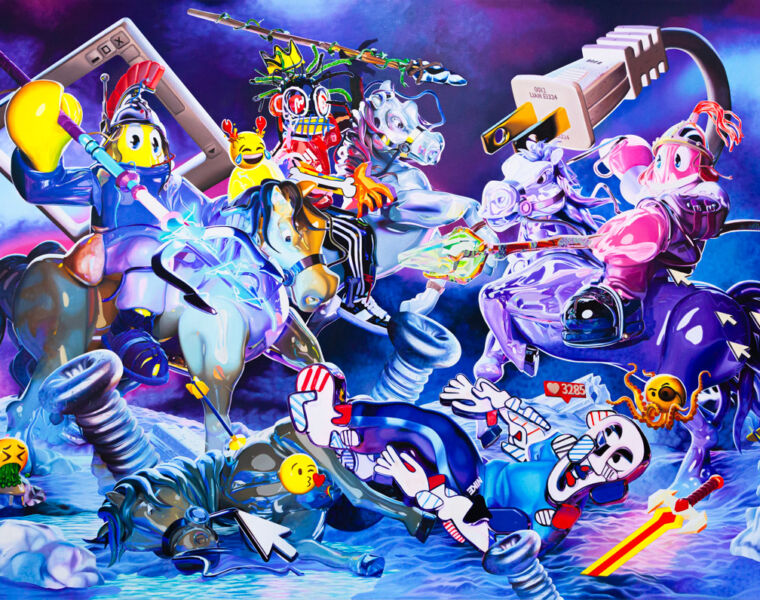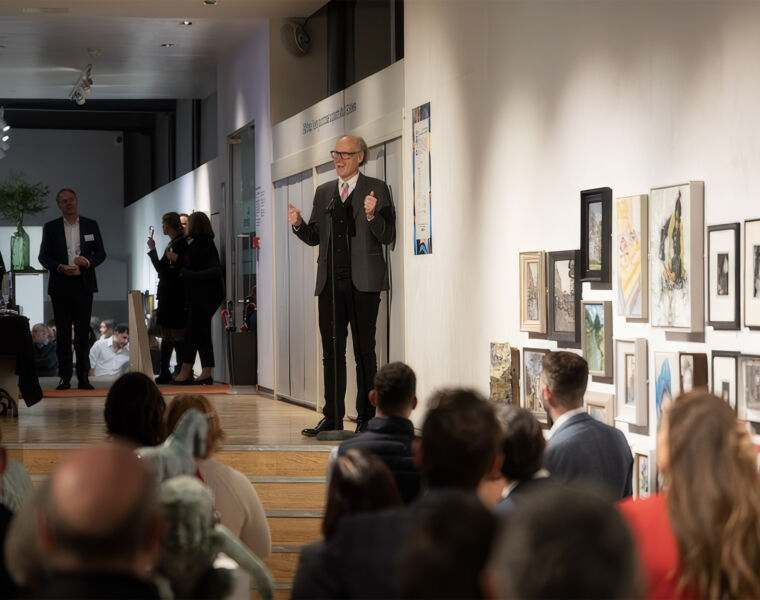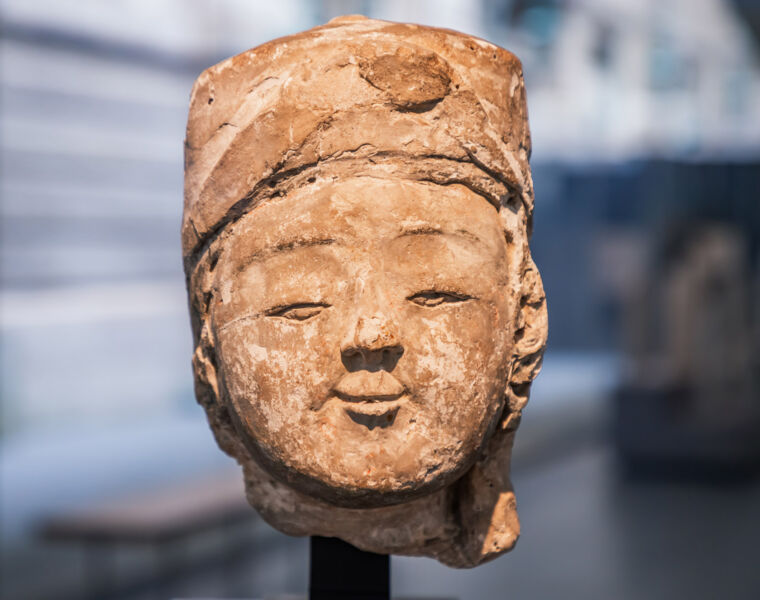Marian Goodman will present a major exhibition of two multiscreen film installations by William Kentridge which will be on view from Tuesday, January 12 through to Saturday, February 20th, 2016.
The first presentation in the U.S of these new works, More Sweetly Play the Dance, commissioned by the EYE Filmmuseum Amsterdam and the Lichtsicht- Projection Biennale, Bad Rothenfelde, Germany, was presented at EYE April 25 – August 30, 2015 and outdoors in open air in Bad Rothenfelde . Notes Toward a Model Opera, was shown at the Ullens Center for Contemporary Art, Beijing from June 27-August 30, 2015.

Shown in the North Gallery, More Sweetly Play the Dance is an eight-screen danse macabre, reminding one of the medieval tradition which summons diverse vestiges of humanity in a paradox of revelry and mourning. William Kentridge presents us with part carnival, protest, and exodus: a 45 metre caravan traversing in a sphere around us with figures in procession, a form the artist invoked in his 1999 Shadow Procession. About the processional form, Kentridge says: “In some ways we first come across it in Plato’s Allegory of the Cave. In a prelude to talking about the responsibility of the philosopher king, he describes people walking behind a screen carrying wooden and stone objects in their hands, their shadows thrown onto the wall opposite the prisoners shackled in the cave watching the shadows.”
In this ironic dance of life an entire brass band leads the procession with a wailing but vital, defiant anthem addressing the “Sisyphean task of showing people in the cave the necessity of viewing the light” : skeletal silhouettes, robed figures, priests, anonymous carriers, fleeing refugees, itinerants carrying saints, stick fighters, the sick, miners performing spade dances, in short, representatives of history personifying the march from one country to another, from one civilization to another, from one identity to an uncertain future. From genesis to the end, an endless procession, all of history carried by them. Represented by cut out profiles transcribed from Kentridge drawings they move in succession across a barren mining landscape, figures coalescing into a roving frieze of images with uncanny resonance to modern day refugees and current political events.

In the South Gallery Notes Towards a Model Opera is a recent work within a larger arc of works by Kentridge which he says respond “unwittingly to the despair at the end of utopian projects.” A three-screen film installation which takes as its starting point the legacy of the cultural revolution in China, Notes Towards a Model Opera was initiated by the artist’s research into the dances and model operas commissioned by Madame Mao, Eight Model Revolutionary Operas, which conflated “vainglorious folklore, jingoistic representations of military victories, martial arts and ballet”. “Evoking the tradition of the Peking Opera and nineteenth-century classical dance, [they] were filled with images of red flags, with dancers en point with Chinese carbines fighting the Japanese, the small committee of the village communists winning out over imperial aggressors.”

Kentridge subverts the form, taking aim at a central tenet of the revolution, the transformation of the consciousness of the people, invoking radical slogans and absurd dictums and presenting a cast of characters who weave between genres, from South African choreography to classical ballet, populating the screen while images of famine and deprivation reduce the orthodoxy to postures. The soundtrack for the piece, arranged by the composer Philip Miller, is based on various elaborations of the communist anthem The Internationale, and ranges in style from period 1950s colonial dance bands to South African toyi-toyi chanting protest marches. Dada Masilo, a long time collaborator of Kentridge’s, dances in a cultural revolutionary uniform while wielding guns which double as limbs. Her fellow cadres wave scarlet flags while torn maps, calligraphy and pages from the notebook that gave this work its title, project a constant flux of stage settings.

In one scene, Masilo wears a dunce’s hat and billboards covered in slogans, re-enacting the self-denunciatory public rituals that many Chinese academics were forced to endure under Mao. But even here – in contrast to the original model operas’ certainties – Kentridge’s approach is to elucidate through peripheral associations: this humiliated professor is part Goya etching, part Dadaist performance, part contemporary African reeling from the sudden wave of Chinese economic re-colonisation of her continent. Or, as Andrew Solomon puts it in the Ullens catalogue, ‘[Kentridge]…the patron saint of ambiguity’ has again eschewed straightforward cogent storytelling for ‘seducing us with scraps of lucidity’. This love of obfuscation connects his practice directly with those of imperial-era Chinese artists, as does his blurring of language and image to Chinese literati culture as a whole. All three originated within authoritarian societies in which ambiguity and an adept use of metaphor often prove pragmatic.
William Kentridge was born in 1955 in Johannesburg, where he currently lives and works. His work has been exhibited widely throughout the world. Most recently Notes Towards a Model Opera was presented at the Ullens Center in Beijing, China (2015). This exhibition is currently being presented as Peripheral Thinking at The National Museum of Modern and
Contemporary Art, Seoul (through March 2016). A major traveling exhibition, Fortuna, has been touring Latin America since 2012, most recently showing at the Museo Ampara in Puebla Mexico (2015). Other recent solo shows have been presented at the Espoo Museum of Modern Art, Espoo, Finland (2014); ICA Boston, Boston, Massachusetts (2014) and The Metropolitan Museum of Art, New York (2013).
Kentridge’s production of Alban Berg’s ‘Lulu’ was presented at the Metropolitan Opera in New York this past fall and will be at the English National Opera, London in 2016. Other theatre productions include ‘Refuse the Hour’, most recently shown in 2015 at Brooklyn Academy of Music, New York and at Yale University, New Haven, Connecticut.
A production of Franz Schubert’s ‘Winterreise’ was presented in 2014 at Lincoln Center, New York; Festival d’Aix-en Provence, France; the Holland Festival in Amsterdam; and the Wiener Festwochen in Vienna. In 2010 he presented Shostokovich’s ‘The Nose’, a co-production of the Metropolitan Opera, the Festival d’Aix-en-Provence, and the Opéra National de Lyon, France.
Kentridge has participated in Documenta (2012, 2002, 1997) as well as the Venice Biennale (2015, 2005, 1999 and 1993). In 2010, Kentridge received the prestigious Kyoto Prize in recognition of his contributions in the field of arts and philosophy. In 2011, he was elected as an Honorary Member of the American Academy of Arts and Letters, and received the degree of Doctor of Literature honoris causa from the University of London. In 2012, Kentridge presented The Charles Eliot Norton Lectures at Harvard University and was elected member of the American Philosophical Society and of the American Academy of Arts and Sciences. Also in that year, he was awarded the Dan David Prize by Tel Aviv University, and was named as Commandeur des Arts et Lettres by the French Ministry of Culture and Communication. In 2013, William Kentridge was awarded an Honorary Doctorate in Fine Arts by Yale University. In 2014 he received an Honorary Doctorate in Literature from the University of Cape Town, and in 2015 was appointed as an Honorary Academician of the Royal Academy in London.
William Kentridge Installations: Where and How
The William Kentridge opening reception will take place on Tuesday, January 12th from 6-8 pm. For further inquiries, please contact the Gallery at: 212 977 7160 or visit www.mariangoodman.com.





You must be logged in to post a comment.